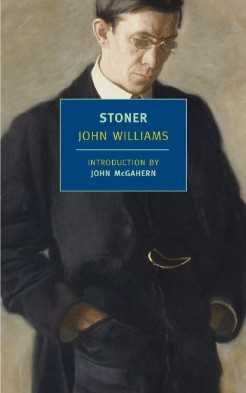William Stoner entered the University of Missouri as a freshman in the year 1910, at the age of nineteen. Eight years later, during the height of World War I, he received his Doctor of Philosophy degree and accepted an instructorship at the same University, where he taught until his death in 1956. He did not rise above the rank of assistant professor, and few students remembered him with any sharpness after they had taken his courses. When he died his colleagues made a memorial contribution of a medieval manuscript to the University library. This manuscript may still be found in the Rare Books Collection, bearing the inscription: "Presented to the Library of the University of Missouri, in memory of William Stoner, Department of English. By his colleagues."
An occasional student who comes upon the name may wonder idly who William Stoner was, but he seldom pursues his curiosity beyond a casual question. Stoner's colleagues, who held him in no particular esteem when he was alive, speak of him rarely now; to the older ones, his name is a reminder of the end that awaits them all, and to the younger ones it is merely a sound which evokes no sense of the past and no identity with which they can associate themselves or their careers.
He was born in 1891 on a small farm in central Missouri near the village of Booneville, some forty miles from Columbia, the home of the University. Though his parents were young at the time of his birth--his father twenty-five, his mother barely twenty--Stoner thought of them, even when he was a boy, as old. At thirty his father looked fifty; stooped by labor, he gazed without hope at the arid patch of land that sustained the family from one year to the next. His mother regarded her life patiently, as if it were a long moment she had to endure. Her eyes were pale and blurred, and the tiny wrinkles around them were enhanced by thin graying hair worn straight over her head and caught in a bun at the back.
From the earliest time he could remember, William Stoner had his duties. At the age of six he milked the bony cows, slopped the pigs in the sty a few yards from the house, and gathered small eggs from a flock of spindly chickens. And even when he started attending the rural school eight miles from the farm, his day, from before dawn until after dark, was filled with work of one sort or another. At seventeen his shoulders were already beginning to stoop beneath the weight of his occupation.
It was a lonely household, of which he was an only child, and it was bound together by the necessity of its toil. In the evenings the three of them sat in the small kitchen lighted by a single kerosene lamp, staring into the yellow flame; often during the hour or so between supper and bed, the only sound that could be heard was the weary movement of a body in a straight chair and the soft creak of a timber giving a little beneath the age of the house.
